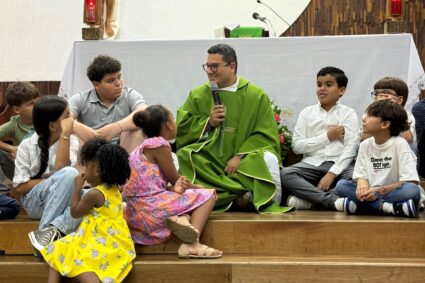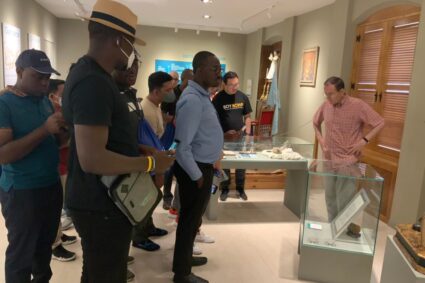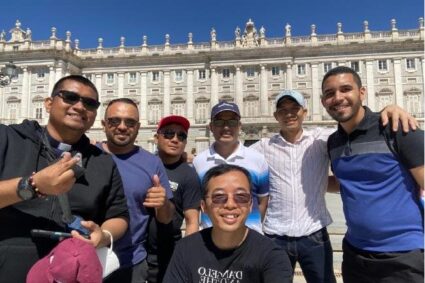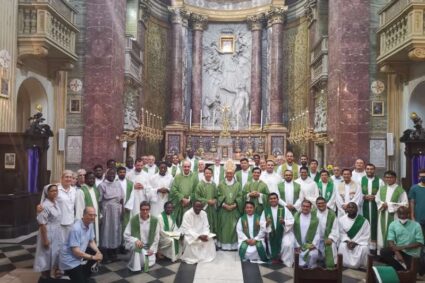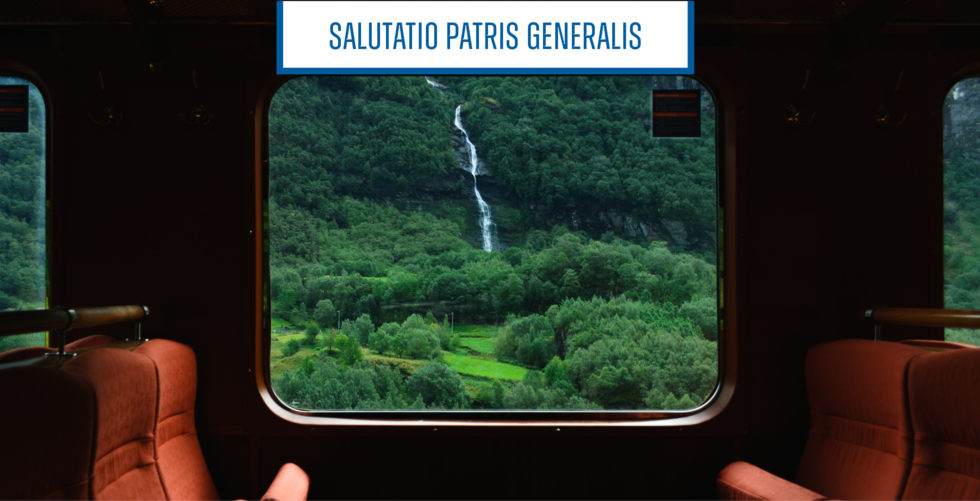
English / Castellano
A few days before leaving for Mexico to participate in the General Chapter, I traveled from Rome to Genoa to accompany a young Italian, Elia Guerra, on his priestly ordination. The journey from Rome to Genoa by train takes five hours, which allows you to devote time to many things; also to reflect.
At a certain time, I searched online for the specific route of the train, placing its number in the search engine. And there appeared, in a complete and detailed form, the “road map” of the trip: each and every one of the stops, the waiting time in each place, the departure time of each point, and the time of arrival of the train to its final destination, Genoa station.
I was preparing a reflection on the accompaniment of young adult religious, which I planned to present at the General Chapter. And the example of the “road map” of the train helped me to become aware that our life, the life of each one of us, and especially the life of the young Piarists who are ordained and face their first years of adult life is not, at all, like the journey of a train. God does not give us a “road map” that details what we are going to live and how we are going to live it. On the contrary, our life is very open, and in it we live very diverse processes that, little by little, are shaping the Piarist that we are.
Our challenge is precisely this: to live a process in which we can grow in fidelity to our vocation, in life experience, in authentic discernment, in generous dedication and in full Piarist identity. The “road map” is wide open, and many options and possibilities emerge in it. But the challenge is one: to walk faithfully, day by day, to be able to incarnate with the gift of vocation received, taking it, little by little, to its fullness.
In this journey there is a particularly decisive stage, which is that of the young adult religious. It is no secret that this is the life cycle that worries me the most. And the reason for my concern is that I am convinced that in those early years much of the “success of the trip” is at stake. That is why I believe that it is very important for our Order – and for the whole of Consecrated Life – to accompany in an appropriate way the process of these religious, and to do it as what they are: in an adult and mature way. Only in this way will it work and only in this way can we carry out this accompaniment.
I would like to offer some concrete clues to this formidable challenge: to accompany the young adult religious on their Piarist path.
I begin with the central objective of this stage: that the young Piarist religious who is in his first years of adult life identify himself with his identity. This is the goal: to live what we are, to embody it with increasing authenticity. And that only works if we live each day as if it were the first and last day of our journey. I like to remember what Fr. Arrupe, who was a General of the Society of Jesus, said to his young adult brothers: “Fall in love. Nothing can matter more than finding God. That is, to fall in love with Him in a definitive and absolute way. What you fall in love with catches your imagination and ends up leaving its mark on everything. It will be what decides what gets you out of bed in the morning, what you make of your sunsets, what you spend your weekends on, what you read, what you know, what breaks your heart and what overwhelms you with joy and gratitude. Fall in love! Abide in love! Everything will be different.”
This is the first key that we must know how to accompany: the care and maturation of the passion from which a young person makes his solemn vows and consecrates his life to the one Lord. You have to know how to give name to the center, to the reasons why you live, to the engine of your day to day, to the gasoline that makes you live, to the day to day that turns your routine into surprise and your daily work into opportunity. This is the subject that must always be talked about, and the key to which we must be able to approach – if the brother allows us to do so – to accompany his process.
Secondly, I would like to mention three areas that are particularly significant and that we must know how to face and accompany. I am referring to three very specific aspects, which I express with the brevity that a salutatio requires, but which would deserve a much broader development. I believe that the keys to the process are threefold: the direction we walk, the paths we choose, and the shared awareness from which we walk them.
a. When I contemplate the Piarists around the world who are in their early adult years, I realize that the question I must ask them is this: what you nourish the spirit with, what makes you grow in faith and in the answers that a living faith inspires. The neglect of what is not urgent but fundamental, in the long run, is always paid. On the answer to this question depends on the explanation of his daily life: the strength with which he works, the dedication to the mission or to his things, the transparency of life, the care of the vocation, the ability to assume responsibilities, the availability for the Province, his centered or uncentered life, etc.
b. The second question I must ask them is a consequence of the first: how, with whom and at what level do you share that profound experience that is the reason for your Piarist being. At what level you let yourself be questioned, with whom and in what way you build the path, how you let yourself be helped, on the basis of what community context you live, decide, get enlivened or serene, dream and build. And I am not just talking about the specific local community, but about the group of those who “feel and dream of the same thing.”
c. And the third is this: how you understand and how you live the dedication of life, the wear and tear for children and young people, for the school, for the Province, for the Order, for the Kingdom of God and his Justice. How is your availability, your mood, your endurance, your patient listening and welcoming, your clarity and intelligence in defining what is worthwhile and what is not, etc.
I think that the Pious Schools will have a future if we live a deep and careful Piarist experience of vocation. The great incongruity in Religious Life is to believe in God, to want to give one’s life for others, to renounce other highly positive and healthy aspects of life, and, nevertheless, not to make God and the aspects of vocation the center of our life. And I see this in too many places and in different ways. We must struggle against this. This is the process. We are men of God, of community and of mission. These are the questions we have to ask ourselves, and this is the depth from which we must ask them.
Thirdly, I would like to propose some attitudes that help decisively in these processes – in the personal process and in that of the accompaniment – and that it is good to enhance. I will mention, again, only three.
a. The search for balance between the various dimensions of our life. It is not a question of balancing – superficially – “community” with “work”, or with “prayer”, or vice versa. This balance is not a matter of “organization” or “agenda”, although everything helps. It is not simply a matter of “proportion of schedules”. It is a matter of passion, of vocational intensity, of real desire to live what I have assumed as a vocation, to let myself be contrasted, to learn. Our vocation is a way of life. Life is what makes possible greater synthesis: between prayer and action, between relationship and work, between theory and praxis, etc. Ours, I insist on it, is a way of life. This is what we have to take care of. For us to carry out our mission and to live in community, and to be men of God, the same thing is required of us: an authentically incarnate life, so that we can come out of ourselves. Without this process there will be no life, and therefore no community and/or mission. It may seem strange for me to say that balance is a matter of passion, but I am convinced of it. Passion coming from a center that is cared for and lived with honesty. Only this passionate balance allows an attentive listening to the personal reality, in which God works.
b. The transparency of life. This is one of the keys to our process, which helps us decisively to live in fidelity. Transparency with yourself, with God, and with your brothers and with the people who accompany you. To the first, Calasanz gave it a beautiful name, and considered it central in the Piarists: self-knowledge. The second is the certain path to an authentic relationship with God: no one deceives God, and no one puts himself in the presence of God to hide his soul. Rather what we do to hide ourselves is to forget the prayer or make it a routine. The third is the key to accompaniment: to find a community life and a personal accompaniment which allows us to walk with that freedom that gives us the sincerity and authenticity of life. When our process is transparent, authenticity is possible and double life – or shortcuts – have no place.
c. Know how to “give name” to what we live. This is the proper thing about maturity. Give name to what helps us and what clogs us. Both are part of our lives. And in the life cycle that concerns us, they acquire very specific and concrete forms that it is good to know how to recognize. Some examples, mixing wheat and tares and without any intention of being exhaustive: taking on responsibilities and knowing how to carry them out; confusing fruitfulness with success; lifestyles that separate – or oppose – community life, mission and prayer; confusing leadership with individualism; believing that belonging to the Province or the confidence of the superior depends on the positions or responsibilities entrusted to you; working on affectivity as what it really is: a powerful force that defines and qualifies our life; having an accurate discernment to detect our temptation to worldliness; fighting against clericalism by starting by recognizing that I am not free of it; gradually accepting that “passion and results” or “expectations and fruits” are never fully related; working on the dynamisms proper to each of the vows that make our consecration explicit, etc.
Finally, I would like to recall that our General Chapter approved the insertion into the Rules of a very significant point: the need for all the Provinces to design and organize the process of an integral accompaniment of religious who are in their first years of their adult life. I am sure that over the next few years we will learn a lot from these important processes, which seek that we can all grow in authenticity of vocation. I would like to point out some dynamisms that will help this objective to be fulfilled well and to bear fruit. There will be three of them:
a. Count on the opinion and feeling of those involved. Let us not design a process without taking into account what the beneficiaries of the process live, dream or suffer. Let us do as Calasanz did, when he asked Glicerio the right question: what dwells in the heart of the young Glicerio? This is the starting point.
b. To be clear about the project of life that we have given ourselves and that the Church has consolidated, and that is expressed in our Constitutions. Keeping our ideal project in mind in order to think about the steps that can help us walk towards it is a safe bet.
c. To take care of the dynamisms of authenticity in the daily life of the communities and demarcations, so that the processes of accompaniment are not islands in the middle of the real life of the religious, but proposals that strengthen what they are already living and sharing on a daily basis.
We are facing an exciting challenge. Let us live it with the joy and availability of those who know that they are trying to take care of their own vocation, the best gift they have received from God, our Father.
Receive a fraternal embrace.
Fr. Pedro Aguado Sch. P.
Father General

Acompañar
English / Castellano
Unos días antes de salir de viaje hacia México para participar en el Capítulo General, viajé desde Roma a Génova para acompañar a un joven italiano, Elia Guerra, en su ordenación sacerdotal. El viaje de Roma a Génova en tren dura cinco horas, lo cual permite dedicar tiempo a muchas cosas; también a reflexionar.
En un momento concreto, busqué por internet el trayecto concreto del tren, colocando su número en el buscador. Y allí apareció, completa y detallada, la “hoja de ruta” del viaje: todas y cada una de las paradas, el tiempo de espera en cada lugar, la hora de salida de cada punto, y la hora de llegada del tren a su destino final, la estación de Génova.
Yo estaba preparando una reflexión sobre el acompañamiento de los religiosos adultos jóvenes, que pensaba presentar en el Capítulo General. Y el ejemplo de la “hoja de ruta” del tren me sirvió para hacerme consciente de que nuestra vida, la vida de cada uno de nosotros, y especialmente la vida de los jóvenes escolapios que se ordenan y afrontan sus primeros años de vida adulta no es, en absoluto, como el viaje de un tren. Dios no nos da una “hoja de ruta” en la que se detalla lo que vamos a vivir y cómo lo vamos a vivir. Todo lo contrario, nuestra vida es muy abierta, y en ella vivimos procesos muy diversos que, poco a poco, van configurando el escolapio que somos.
Nuestro desafío es precisamente éste: vivir un proceso en el que podamos crecer en fidelidad vocacional, en experiencia de vida, en discernimiento auténtico, en entrega generosa y en identidad escolapia plena. La “hoja de ruta” está muy abierta, y en ella emergen muchas opciones y posibilidades. Pero el reto es uno: caminar fielmente, día a día, para poder encarnar con el don vocacional recibido llevándolo, poco a poco, a su plenitud.
En este viaje hay una etapa especialmente decisiva, que es la de los religiosos adultos jóvenes. No es ningún secreto que éste es el ciclo vital que más me preocupa. Y la razón de mi preocupación es que estoy convencido de que en esos primeros años se juega buena parte del “éxito del viaje”. Por eso creo que es muy importante para nuestra Orden -y para el conjunto de la Vida Consagrada- acompañar de modo adecuado el proceso de estos religiosos, y hacerlo como lo que son: de modo adulto y maduro. Sólo así funcionará y sólo así podremos llevar adelante este acompañamiento.
Me gustaría ofrecer algunas pistas concretas para este formidable desafío: acompañar a los religiosos adultos jóvenes en su camino escolapio.
Comienzo por el objetivo central de esta etapa: que el joven religioso escolapio que está en sus primeros años de vida adulta se identifique con su identidad. Este es el objetivo: vivir lo que somos, para encarnarlo con creciente autenticidad. Y eso sólo funciona si vivimos cada día como si fuere el primero y el último día de nuestro camino. Me gusta recordar lo que decía el P. Arrupe, que fuera general de la Compañía de Jesús, a sus hermanos adultos jóvenes: “Enamórate. Nada puede importar más que encontrar a Dios. Es decir, enamorarse de Él de una manera definitiva y absoluta. Aquello de lo que te enamoras atrapa tu imaginación y acaba por ir dejando su huella en todo. Será lo que decida qué es lo que te saca de la cama en la mañana, qué haces de tus atardeceres, en qué empleas tus fines de semana, lo que lees, lo que conoces, lo que rompe tu corazón y lo que te sobrecoge de alegría y gratitud. ¡Enamórate! ¡Permanece en el amor! Todo será de otra manera”.
Esta es la primera clave que hay que saber acompañar: el cuidado y la maduración de la pasión desde la que un joven hace sus votos solemnes y consagra su vida al único Señor. Hay que saber dar nombre al centro, a las razones por las que vives, al motor de tu día a día, a la gasolina que te hace vivir, al día a día que convierte tu rutina en sorpresa y tu quehacer diario en oportunidad. Este es el tema del que siempre hay que hablar, y la clave a la que tenemos que poder acercarnos -si el hermano así nos lo permite- para acompañar su proceso.
En segundo lugar, me gustaría citar tres ámbitos que son especialmente significativos y que hay que saber afrontar y acompañar. Me refiero a tres aspectos bien concretos, que expreso con la brevedad que exige una salutatio, pero que merecerían un desarrollo mucho más amplio. Creo que las claves del proceso son tres: la dirección hacia la que caminamos, los caminos que elegimos y la conciencia compartida desde la que los recorremos.
a. Cuando contemplo a los escolapios de todo el mundo que están en sus primeros años de vida adulta, me doy cuenta de que la pregunta que les debo hacer es ésta: con qué alimentas el espíritu, qué es lo que te hace crecer en la fe y en las respuestas que una fe viva inspira. El descuido de lo que no es urgente pero sí fundamental, a la larga, siempre se paga. De la respuesta a esta pregunta depende la explicación de su vida cotidiana: la fuerza con la que trabaja, la entrega a la misión o a sus cosas, la transparencia de vida, el cuidado de la vocación, la capacidad de asumir responsabilidades, la disponibilidad para la Provincia, su vida centrada o descentrada, etc.
b. La segunda pregunta que debo hacerles es consecuencia de la primera: cómo, con quién y a qué nivel compartes esa profunda experiencia que es la razón de tu ser escolapio. A qué nivel te dejas interpelar, con quiénes y de qué manera construyes camino, cómo te dejas ayudar, desde qué contexto comunitario vives, decides, te animas o te serenas, sueñas y construyes. Y no hablo sólo de la comunidad local concreta, sino del grupo de los que “sienten y sueñan con lo mismo”.
c. Y la tercera es ésta: cómo entiendes y cómo vives la entrega de la vida, el desgaste por los niños y jóvenes, por la escuela, por la Provincia, por la Orden, por el Reino de Dios y su Justicia. Cómo es tu disponibilidad, tu talante, tu aguante, tu paciente escucha y acogida, tu claridad e inteligencia al definir lo que vale la pena y lo que no, etc.
Pienso que las Escuelas Pías tendrán futuro si vivimos una honda y cuidada experiencia vocacional escolapia. La gran incongruencia en la Vida Religiosa es creer en Dios, querer dar la vida por los demás, renunciar a otros aspectos de la vida altamente positivos y sanos, y, con todo, no hacer de Dios y de las claves vocacionales el centro de nuestra vida. Y esto lo veo en demasiados lugares y de diversas formas. Hay que luchar contra ello. Este es el proceso. Somos hombres de Dios, de comunidad y de misión. Estas son las preguntas que nos tenemos que hacer, y esta la profundidad desde las que nos las debemos plantear.
En tercer lugar, quisiera proponer algunas actitudes que ayudan decisivamente en estos procesos, el personal y el del acompañamiento, y que es bueno potenciar. Me referiré -también- sólo a tres.
a. La búsqueda del equilibrio entre las diversas dimensiones de nuestra vida. No se trata de equilibrar -superficialmente- “lo comunitario” con “el trabajo”, o con “lo orante”, o viceversa. Este equilibrio no es una cuestión de “organización” ni de “agenda”, aunque todo ayuda. No es simplemente un tema de “proporción de horarios”. Es un tema de pasión, de intensidad vocacional, de deseo real de vivir lo que he asumido como vocación, de dejarme contrastar, de aprender. Nuestra vocación es una manera de vivir. La vida es la que hace posible síntesis mayores: entre oración y acción, entre relación y trabajo, entre teoría y praxis, etc. Lo nuestro, insisto en ello, es una manera de vivir. Eso es lo que tenemos que cuidar. Para desarrollar nuestra misión y para vivir en comunidad, y para ser hombres de Dios, se requiere la misma cosa: una vida auténticamente encarnada, de manera que podamos salir de nosotros mismos. Sin ese proceso no habrá vida, y, por tanto, tampoco comunidad y/o misión. Puede parecer extraño que yo diga que el equilibrio es una cuestión de pasión, pero estoy convencido de ello. Pasión desde un centro que se cuida y se vive con honestidad. Sólo ese equilibrio apasionado permite una escucha atenta de la realidad personal, en la que Dios trabaja.
b. La transparencia de vida. Esta es una de las claves de nuestro proceso, que nos ayuda decisivamente a vivir en fidelidad. Transparencia contigo mismo, con Dios, y con tus hermanos y las personas que te acompañan. A la primera, Calasanz le dio un nombre bellísimo, y la consideró central en los escolapios: conocimiento de ti mismo. La segunda es el camino cierto para una auténtica relación con Dios: nadie engaña a Dios, y nadie se pone en presencia de Dios para ocultar su alma. Más bien lo que hacemos para ocultarnos es olvidar la oración o convertirla en rutina. La tercera es la llave del acompañamiento: encontrar una vida comunitaria y un acompañamiento personal que nos permita caminar con esa libertad que nos da la sinceridad y autenticidad de vida. Cuando nuestro proceso es transparente, la autenticidad es posible y la doble vida -o los atajos- no tienen lugar.
c. Saber “dar nombre” a lo que vivimos. Esto es lo propio de la madurez. Dar nombre a lo que nos ayuda y a lo que nos atasca. Uno y otro forman parte, de nuestra vida. Y en el ciclo vital que nos ocupa, adquieren formas muy específicas y concretas que es bueno saber reconocer. Unos ejemplos, mezclando trigo y cizaña y sin ningún ánimo de exhaustividad: asumir responsabilidades y saber llevarlas adelante; confundir fecundidad con éxito; estilos de vida que separan -u oponen-vida comunitaria, misión y oración; confundir liderazgo con individualismo; creer que la pertenencia a la Provincia o la confianza del superior depende de los cargos o responsabilidades que te encomienden; trabajar la afectividad como lo que realmente es: una fuerza poderosa que define y cualifica nuestra vida; tener un certero discernimiento para detectar nuestra tentación de mundanidad; luchar contra el clericalismo empezando por reconocer que no estoy libre de él; asumir poco a poco que “pasión y resultados” o “expectativas y frutos” nunca suelen estar en plena relación; trabajar los dinamismos propios de cada uno de los votos que explicitan nuestra consagración, etc.
Finalmente, quisiera recordar que nuestro Capítulo General aprobó introducir en las Reglas un punto muy significativo: la necesidad de que en todas las Provincias se diseñe y organice el proceso propio de un acompañamiento integral de los religiosos que están en sus primeros años de su vida adulta. Estoy seguro de que a lo largo de estos próximos años vamos a aprender mucho de estos procesos tan importantes, que buscan que todos podamos crecer en autenticidad vocacional. Me gustaría apuntar algunos dinamismos que ayudarán a que este objetivo se cumpla bien y pueda dar frutos. Serán tres:
a. Contar con el parecer y el sentir de los protagonistas. No diseñemos un proceso sin tener en cuenta lo que viven, sueñan o sufren los destinatarios del proceso. Hagamos como hizo Calasanz, cuando planteó a Glicerio la pregunta certera: ¿qué habita en el corazón del joven Glicerio? Este es el punto de partida.
b. Tener claro el proyecto de vida que nos hemos dado y que la Iglesia ha consolidado, y que está expresado en nuestras Constituciones. Tener en cuenta nuestro proyecto ideal para pensar los pasos que nos pueden ayudar a caminar hacia él es una apuesta segura.
c. Cuidar los dinamismos de autenticidad en la vida cotidiana de las comunidades y demarcaciones, para que los procesos de acompañamiento no sean islas en medio de la vida real de los religiosos, sino propuestas que fortalecen lo que ya están viviendo y compartiendo en el día a día.
Estamos delante de un reto apasionante. Vivámoslo con la alegría y disponibilidad del que sabe que está tratando de cuidar su propia vocación, el mejor regalo que ha recibido de Dios, nuestro Padre.
Recibid un abrazo fraterno.
P. Pedro Aguado Sch. P.
Padre General



